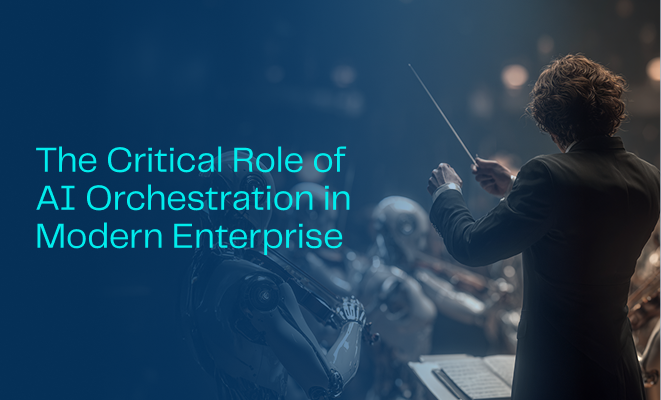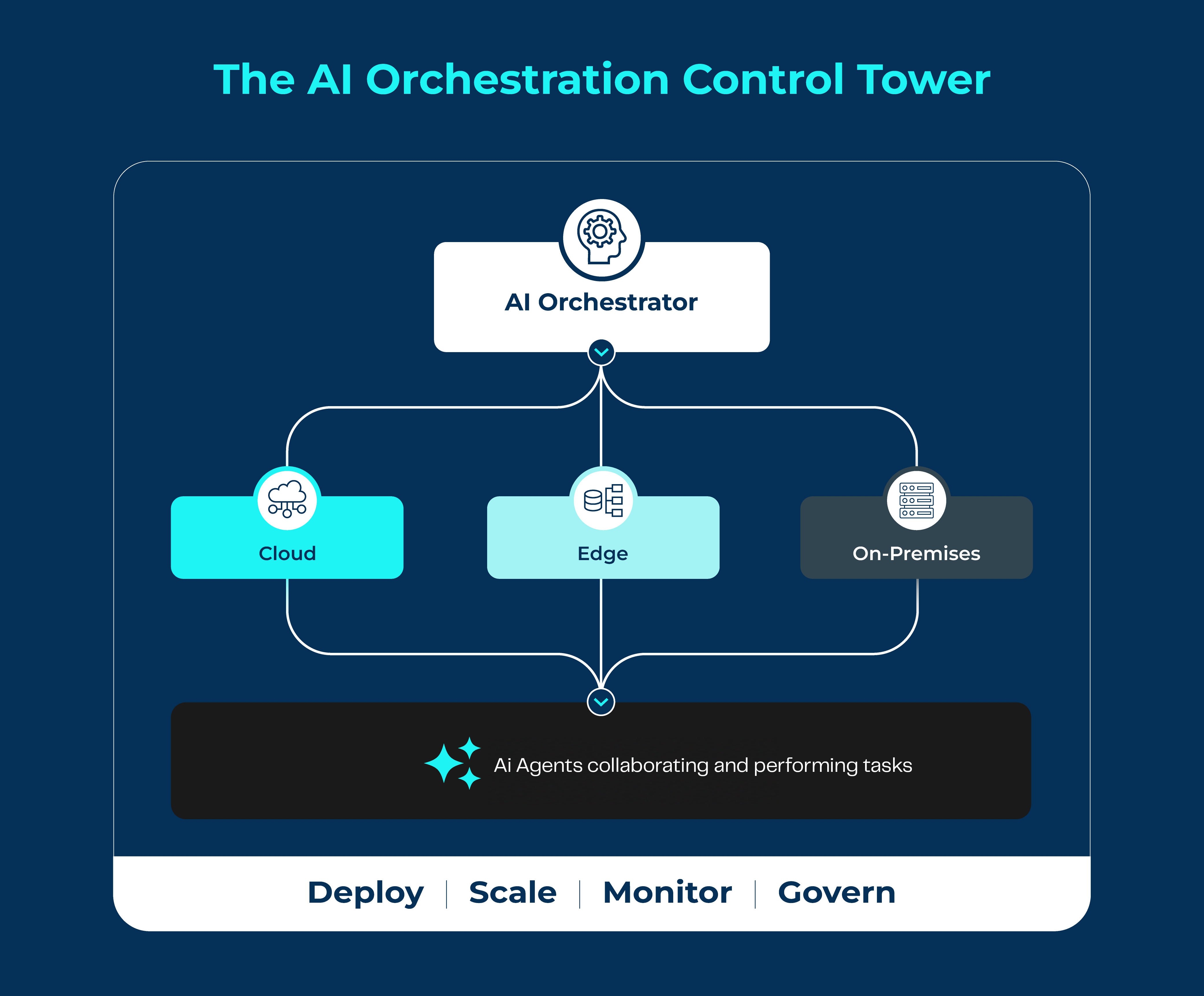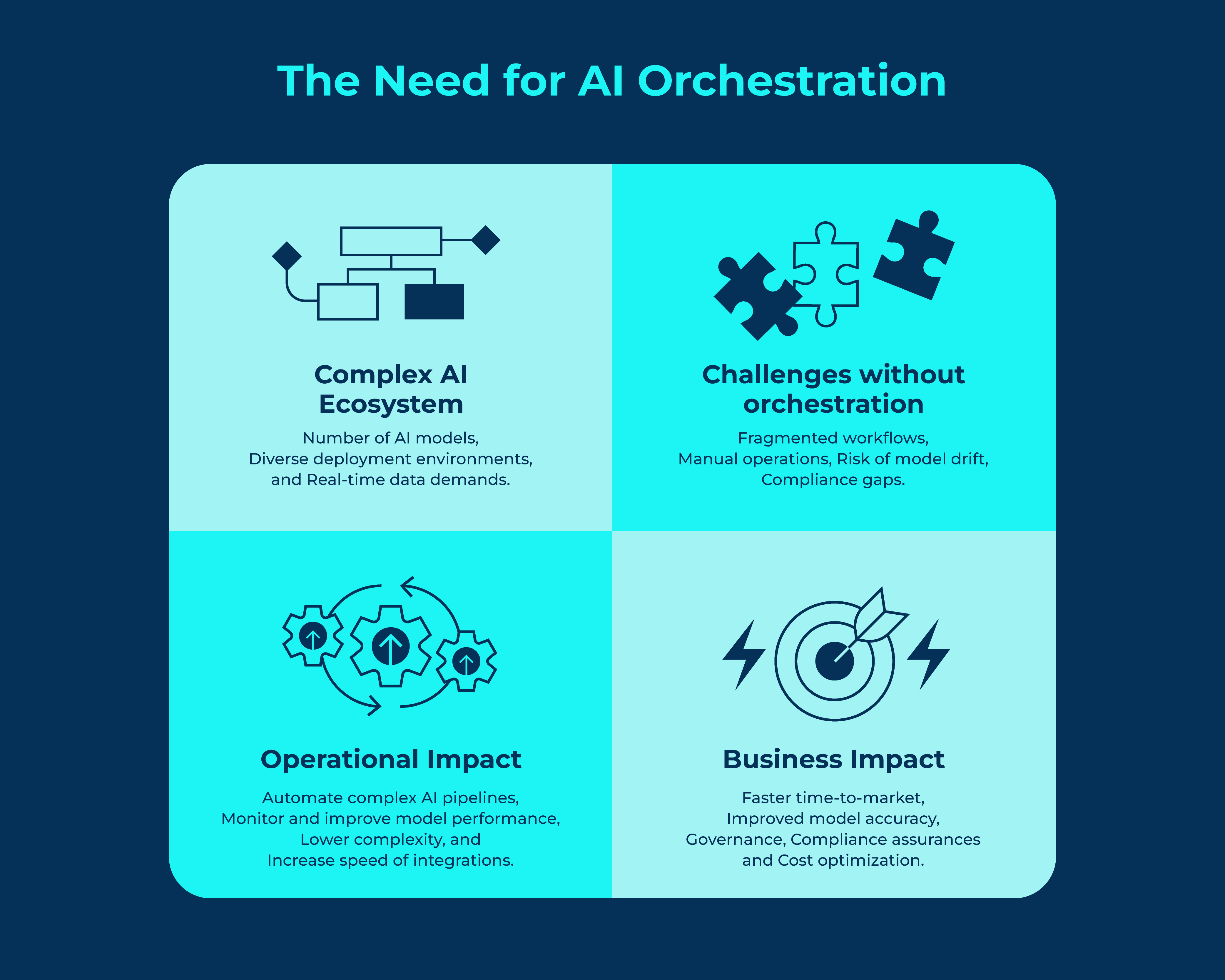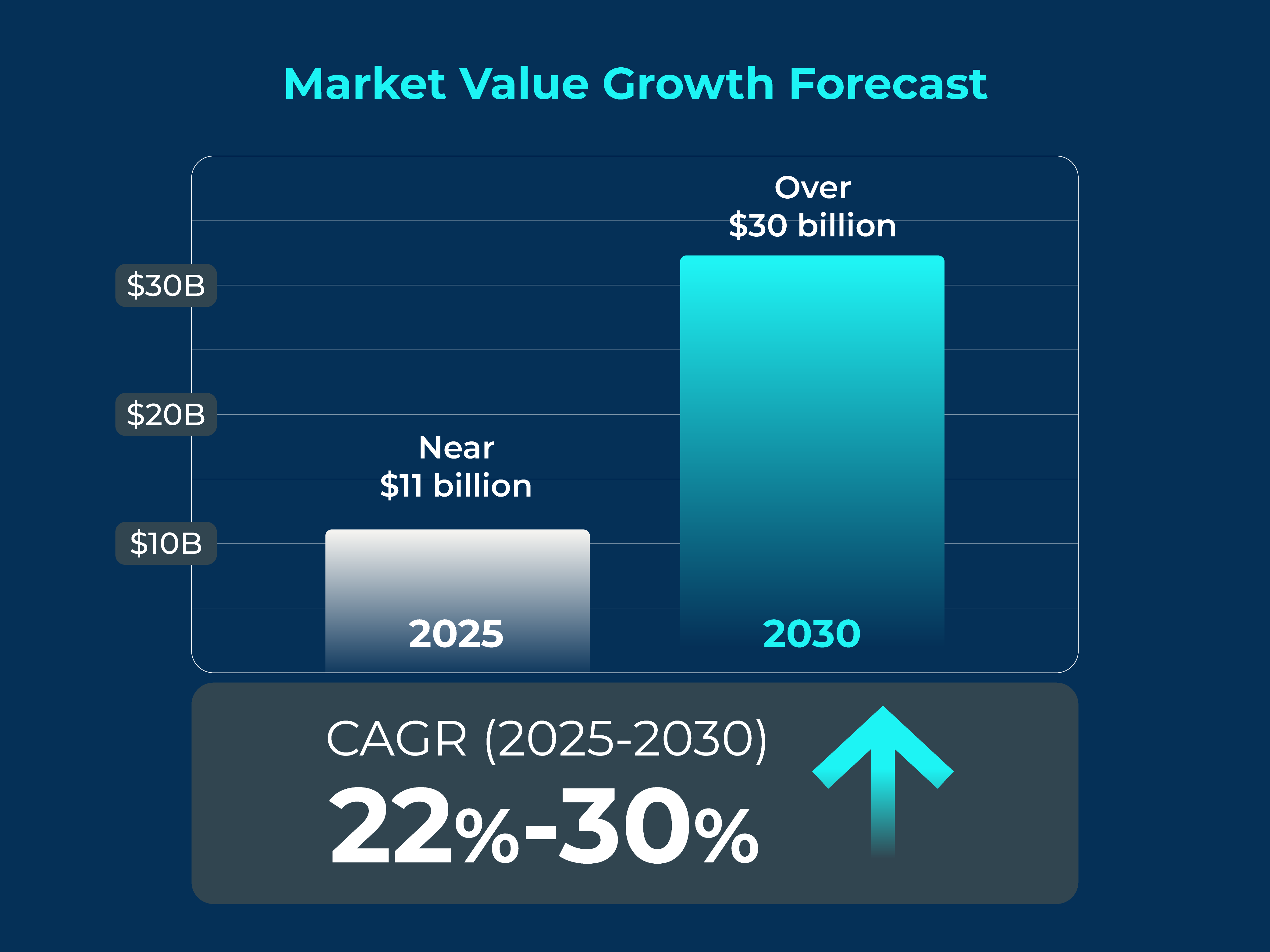
In an era where artificial intelligence is rapidly transforming industries, the biggest barrier to unlocking AI’s full potential is not a lack of innovation. It is the chaotic complexity of selecting, integrating platforms, and managing and scaling countless models and workflows across diverse environments. If left unmanaged, this complexity leads to inefficiencies, inconsistent outcomes, and compliance risks that hinder the realization of AI’s full promise.

AI orchestration is the indispensable framework that enables enterprises to seamlessly coordinate AI initiatives across cloud, edge, and on-premises environments. Further defined, AI Orchestration involves coordinating and automating the deployment, scaling, monitoring, and governance of AI/ML models and workflows across hybrid and multi-cloud environments. Orchestration enables autonomous AI agents to plan, execute, and collaborate on complex tasks.
Without orchestration, AI risks staying stuck in pilot purgatory. By leveraging advanced orchestration platforms and consulting expertise, organizations can speed up deployment, govern AI workflows at scale, ensure compliance, and rapidly realize measurable business results.

Today there are many platforms that support the Model Context Protocol (MCP) for flexible integration with diverse AI tools and data sources, as well as the Agent2Agent (A2A) protocol for seamless interoperability with third-party AI agents. Additionally, many offer support for complex hybrid and multi-cloud environments. The following AI orchestration platforms are highlighted as they are expected to garner the most market share over the next three years. These offerings from Cloud Data Platform (CDP) providers and Hyper-Scalers benefit from established enterprise footprints, extensive cloud infrastructure, broad AI and data tool integration, and ongoing investments in automation and governance capabilities.
There are additional open-source, Agent-native frameworks, like LangGraph, Temporal, and Crew.AI, that are designed to build and orchestrate multi-agent systems. For example, Crew.AI can integrate with platforms such as Snowflake, AWS Bedrock, and Microsoft Copilot Studio for agent orchestration, adding autonomy and workflow logic beyond model inference.
Technology consulting companies play a crucial role in helping organizations unlock the full potential of AI orchestration. They can evaluate clients’ current AI capabilities and orchestration needs, identifying gaps and opportunities for value creation. Empowering clients to leverage AI orchestration not only as a technology but as a strategic enabler of business agility and competitive advantage.
This foundation ensures that platform selection and integration are closely aligned with the company’s existing infrastructure, governance & compliance requirements.
Beyond strategy, consulting firms can add significant value by:
This end-to-end service model empowers clients to realize measurable, ongoing improvements in operational efficiency, agility, and compliance while navigating the complex landscape of modern AI deployments and orchestration with confidence.

Enterprises will require professionals skilled not only in AI technology but also in orchestration, governance, and the art of orchestrating human-AI partnerships. New enterprise roles focused on AI Orchestration and effectiveness are emerging and are expected to grow rapidly, driven by the rise of agentic AI and the shift toward human-AI collaboration.
Key roles organizations should start training, hiring, or contracting for include:
AI Orchestration Engineer / Conductor
Context Engineer/ Semantic Architect
MCP Engineer (Model Context Protocol)
MLOps Engineer
These emerging roles represent a transformational shift from coding-focused jobs to strategic oversight & collaboration roles essential for scaling responsible AI systems.
The market for AI orchestration services is poised for rapid expansion, fueled by growing enterprise AI adoption, stricter regulatory compliance demands, increased hybrid cloud deployments, and the need for autonomous multi-model governance.
Industry analysts project a robust compound annual growth rate (CAGR) between 22% to 30% annually from 2025 to 2030. This will drive a market value surge from nearly $11 billion in 2025 to over $30 billion by 20302.
This expansive growth reflects a shift from basic AI pilots toward governed, outcome-driven automation that seamlessly integrates multi-agent orchestration and ML workflow automation within secure cloud environments.

As enterprises continue adopting multi-cloud architectures, integrating complex AI models, implementing Agentic AI, and seeking scalable, governance-ready solutions, the ability to coordinate and automate AI at scale will become a vital differentiator. Companies that recognize the strategic importance of AI orchestration and invest in the right platforms and expertise today will be positioned to lead in innovation, resilience, and competitive advantage tomorrow.
About the Author:
Chad Holmes is a senior leader at Blend360 and focuses on the intersection of AI-Empowerment, Human Experience (HX) Design, and Intelligent Operations. He specializes in capitalizing on emerging technology to reimagine business models to create transformative, and accelerated value creation.
Blend is a premier AI services provider, committed to co-creating meaningful impact for its clients through the power of data science, AI, technology, and people. We have a mission to fuel bold visions, Blend tackles significant challenges by seamlessly aligning human expertise with artificial intelligence. The company is dedicated to unlocking value and fostering innovation for its clients by harnessing world-class people and data-driven strategy. We believe that the power of people and AI can have a meaningful impact on your world. For more information, visit www.blend360.com
In an era where artificial intelligence is rapidly transforming industries, the biggest barrier to unlocking AI’s full potential is not a lack of innovation. It is the chaotic complexity of selecting, integrating platforms, and managing and scaling countless models and workflows across diverse environments. If left unmanaged, this complexity leads to inefficiencies, inconsistent outcomes, and compliance risks that hinder the realization of AI’s full promise.

AI orchestration is the indispensable framework that enables enterprises to seamlessly coordinate AI initiatives across cloud, edge, and on-premises environments. Further defined, AI Orchestration involves coordinating and automating the deployment, scaling, monitoring, and governance of AI/ML models and workflows across hybrid and multi-cloud environments. Orchestration enables autonomous AI agents to plan, execute, and collaborate on complex tasks.
Without orchestration, AI risks staying stuck in pilot purgatory. By leveraging advanced orchestration platforms and consulting expertise, organizations can speed up deployment, govern AI workflows at scale, ensure compliance, and rapidly realize measurable business results.

Today there are many platforms that support the Model Context Protocol (MCP) for flexible integration with diverse AI tools and data sources, as well as the Agent2Agent (A2A) protocol for seamless interoperability with third-party AI agents. Additionally, many offer support for complex hybrid and multi-cloud environments. The following AI orchestration platforms are highlighted as they are expected to garner the most market share over the next three years. These offerings from Cloud Data Platform (CDP) providers and Hyper-Scalers benefit from established enterprise footprints, extensive cloud infrastructure, broad AI and data tool integration, and ongoing investments in automation and governance capabilities.
There are additional open-source, Agent-native frameworks, like LangGraph, Temporal, and Crew.AI, that are designed to build and orchestrate multi-agent systems. For example, Crew.AI can integrate with platforms such as Snowflake, AWS Bedrock, and Microsoft Copilot Studio for agent orchestration, adding autonomy and workflow logic beyond model inference.
Technology consulting companies play a crucial role in helping organizations unlock the full potential of AI orchestration. They can evaluate clients’ current AI capabilities and orchestration needs, identifying gaps and opportunities for value creation. Empowering clients to leverage AI orchestration not only as a technology but as a strategic enabler of business agility and competitive advantage.
This foundation ensures that platform selection and integration are closely aligned with the company’s existing infrastructure, governance & compliance requirements.
Beyond strategy, consulting firms can add significant value by:
This end-to-end service model empowers clients to realize measurable, ongoing improvements in operational efficiency, agility, and compliance while navigating the complex landscape of modern AI deployments and orchestration with confidence.

Enterprises will require professionals skilled not only in AI technology but also in orchestration, governance, and the art of orchestrating human-AI partnerships. New enterprise roles focused on AI Orchestration and effectiveness are emerging and are expected to grow rapidly, driven by the rise of agentic AI and the shift toward human-AI collaboration.
Key roles organizations should start training, hiring, or contracting for include:
AI Orchestration Engineer / Conductor
Context Engineer/ Semantic Architect
MCP Engineer (Model Context Protocol)
MLOps Engineer
These emerging roles represent a transformational shift from coding-focused jobs to strategic oversight & collaboration roles essential for scaling responsible AI systems.
The market for AI orchestration services is poised for rapid expansion, fueled by growing enterprise AI adoption, stricter regulatory compliance demands, increased hybrid cloud deployments, and the need for autonomous multi-model governance.
Industry analysts project a robust compound annual growth rate (CAGR) between 22% to 30% annually from 2025 to 2030. This will drive a market value surge from nearly $11 billion in 2025 to over $30 billion by 20302.
This expansive growth reflects a shift from basic AI pilots toward governed, outcome-driven automation that seamlessly integrates multi-agent orchestration and ML workflow automation within secure cloud environments.

As enterprises continue adopting multi-cloud architectures, integrating complex AI models, implementing Agentic AI, and seeking scalable, governance-ready solutions, the ability to coordinate and automate AI at scale will become a vital differentiator. Companies that recognize the strategic importance of AI orchestration and invest in the right platforms and expertise today will be positioned to lead in innovation, resilience, and competitive advantage tomorrow.
About the Author:
Chad Holmes is a senior leader at Blend360 and focuses on the intersection of AI-Empowerment, Human Experience (HX) Design, and Intelligent Operations. He specializes in capitalizing on emerging technology to reimagine business models to create transformative, and accelerated value creation.
Blend is a premier AI services provider, committed to co-creating meaningful impact for its clients through the power of data science, AI, technology, and people. We have a mission to fuel bold visions, Blend tackles significant challenges by seamlessly aligning human expertise with artificial intelligence. The company is dedicated to unlocking value and fostering innovation for its clients by harnessing world-class people and data-driven strategy. We believe that the power of people and AI can have a meaningful impact on your world. For more information, visit www.blend360.com